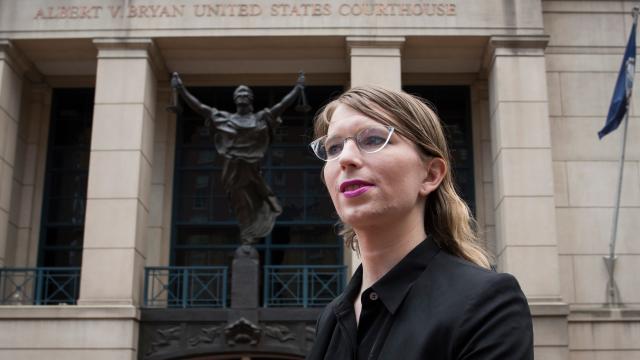In her first public statement since a top United Nations official equated her imprisonment to torture, former Army intelligence analyst Chelsea Manning reaffirmed her pledge to remain in jail rather than testify before a grand jury investigating WikiLeaks founder Julian Assange.
“My long-standing objection to the immoral practice of throwing people in jail without charge or trial, for the sole purpose of forcing them to testify before a secret, government-run investigative panel, remains strong,” Manning said in a statement obtained first by Gizmodo.
In a letter made public last week, Nils Melzer, the U.N. special rapporteur on torture, accused U.S. authorities of violating the international human rights obligations of the United States by imposing on Manning “open-ended, progressively severe” penalties that fulfil “all the constitutive elements of torture, or other cruel, inhuman or degrading treatment or punishment.”
Manning, 32, has spent nearly 300 days in an Alexandra jail in Virginia since she was first subpoenaed to testify in March. She spent 28 days in solitary confinement conditions. Prosecutors say the jail time is intended to coerce Manning into testifying. As she faces no criminal charges, her confinement, by law, cannot be punitive.
Manning’s attorneys have argued that the sanctions have proven ineffective and that no amount of jail time will compel her to testify. She has said she feels a moral obligation to resist testifying before the grand jury.
“Nearly every other legal system in the world condemns coercive confinement, and long ago replaced secret grand juries with public hearings,” Manning said in a statement Thursday. “I am thrilled to see the practice of coercive confinement called out for what it is: incompatible with international human rights standards. Regardless, even knowing I am very likely to stay in jail for an even longer time, I’m never backing down.”
Manning also faces a daily fine of $US1,000 ($1,425) for each day she refuses to cooperate.
In 2013, Juan E. Méndez, the former U.N. special rapporteur on torture and other cruel, inhuman or degrading treatment or punishment, called for a prohibition on prolonged solitary confinement citing “grave and irreparable harm” including “changes in brain functions” and other harmful psychological effects, which, he said, “can become irreversible.”
Méndez classified “prolonged solitary confinement” as the “physical and social isolation of individuals who are confined to their cells for 22 to 24 hours a day” for “any period in excess of 15 days.”
Manning’s attorney, Moira Meltzer-Cohen, called Melzer’s letter “a legally rigorous condemnation of the practice of coercive confinement, and of Ms. Manning’s confinement in particular.”
“While the United States has so far failed to live up to its human rights obligations, I remain hopeful that the government will reconsider its policies in light of the UN’s admonition,” she said.
